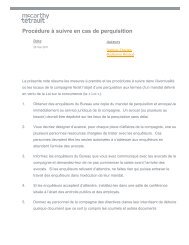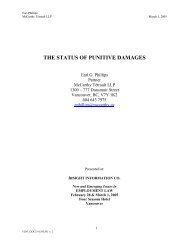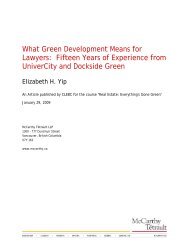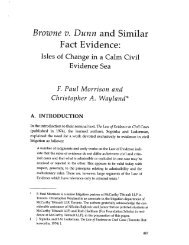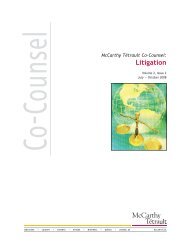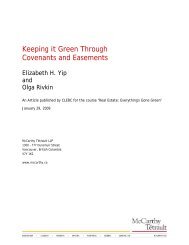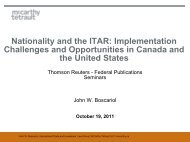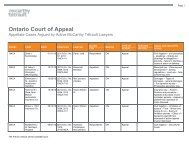The Doctrine of Public Policy in Canadian Contract Law
The Doctrine of Public Policy in Canadian Contract Law
The Doctrine of Public Policy in Canadian Contract Law
You also want an ePaper? Increase the reach of your titles
YUMPU automatically turns print PDFs into web optimized ePapers that Google loves.
44 / Annual Review <strong>of</strong> Civil Litigation<br />
Turn<strong>in</strong>g to the categories themselves, it becomes readily apparent that the<br />
values which they reflect are <strong>in</strong>deed those which may be associated with the<br />
forego<strong>in</strong>g concepts. In the category <strong>of</strong> contracts <strong>in</strong>jurious to the state, we f<strong>in</strong>d<br />
the need for an effective, democratic government that is capable <strong>of</strong> <strong>in</strong>sulat<strong>in</strong>g<br />
its citizens from corruption and foreign conquest. In the category <strong>of</strong> contracts<br />
<strong>in</strong>jurious to the justice system, we f<strong>in</strong>d the need for an effective, orderly judiciary<br />
that is governed by the rule <strong>of</strong> law and is accessible to the general citizenry. In<br />
the category <strong>of</strong> restra<strong>in</strong>t <strong>of</strong> trade, we see the desire to protect the freedom <strong>of</strong> the<br />
<strong>in</strong>dividual, a value also expressed <strong>in</strong> relation to contracts <strong>in</strong> restra<strong>in</strong>t <strong>of</strong> marriage,<br />
the rema<strong>in</strong><strong>in</strong>g non-controversial head fall<strong>in</strong>g with<strong>in</strong> the category <strong>of</strong> contracts<br />
affect<strong>in</strong>g this ancient <strong>in</strong>stitution. F<strong>in</strong>ally, <strong>in</strong> the category <strong>of</strong> immoral contracts,<br />
we may observe a focus upon the dignity (as witnessed <strong>in</strong> the rule aga<strong>in</strong>st<br />
prostitution agreements) and the equality <strong>of</strong> <strong>in</strong>dividuals. <strong>Public</strong> policy as it<br />
currently exists <strong>in</strong> <strong>Canadian</strong> contract law is therefore a doctr<strong>in</strong>e which is devoted<br />
to the protection <strong>of</strong> the state, the judiciary, and the <strong>in</strong>dividual as a free, dignified<br />
and equal agent.<br />
<strong>The</strong> forego<strong>in</strong>g values are not merely <strong>in</strong>cident to the liberal state or the<br />
rule <strong>of</strong> law;225 rather, they are <strong>in</strong>cident <strong>in</strong> a way that is necessary to permit the<br />
fair adjudication and pursuit <strong>of</strong> values hav<strong>in</strong>g regard to the conditions <strong>of</strong> modern<br />
democracy .226 If <strong>in</strong>dividuals were not free, equal and dignified when they came<br />
to debate about and pursue such values, the debate would be unfair, as would<br />
be the pursuit. Similarly, without a state able to guarantee that its <strong>in</strong>dividuals<br />
possess such qualities, and a judiciary capable <strong>of</strong> <strong>in</strong>terpret<strong>in</strong>g and enforc<strong>in</strong>g<br />
their common mean<strong>in</strong>g, such <strong>in</strong>dividuals, and thus the possibility <strong>of</strong> such fairness,<br />
could not exist. This is not to claim that these conditions guarantee the<br />
realization <strong>of</strong> a just society, but only to claim that without them, a just society<br />
(at least <strong>in</strong> the context <strong>of</strong> a liberal democracy) would not be possible.227 Indeed,<br />
these values are precisely those which have been repeatedly recognized by the<br />
225 While the rule <strong>of</strong> law is itself a precondition <strong>of</strong> a just society, it does not exhaust the<br />
latter concept. See British Columbia (A.G.) v. Christie, 2007 SCC 21 at para. 20, stat<strong>in</strong>g<br />
that: "Mlle rule <strong>of</strong> law embraces at least three pr<strong>in</strong>ciples. <strong>The</strong> first pr<strong>in</strong>ciple is that the<br />
law is supreme over <strong>of</strong>ficials <strong>of</strong> the government as well as private <strong>in</strong>dividuals, and<br />
thereby preclusive <strong>of</strong> the <strong>in</strong>fluence <strong>of</strong> arbitrary power'. . . <strong>The</strong> second pr<strong>in</strong>ciple 'requires<br />
the creation and ma<strong>in</strong>tenance <strong>of</strong> an actual order <strong>of</strong> positive laws which preserves and<br />
embodies the more general pr<strong>in</strong>ciple <strong>of</strong> normative order'. . . <strong>The</strong> third pr<strong>in</strong>ciple requires<br />
that 'the relationship between the state and the <strong>in</strong>dividual ... be regulated by law'. . ."<br />
226 As Rawls, supra note 224 at 3-4, notes ". . .a democratic society is not and cannot be a<br />
community, where by a community I mean a body <strong>of</strong> persons united <strong>in</strong> affirm<strong>in</strong>g the<br />
same comprehensive, or partially comprehensive, doctr<strong>in</strong>e. <strong>The</strong> fact <strong>of</strong> reasonable pluralism<br />
which characterizes a society with free <strong>in</strong>stitutions makes this impossible. This<br />
is the fact <strong>of</strong> pr<strong>of</strong>ound and irreconcilable differences <strong>in</strong> citizens' reasonable comprehensive<br />
religious and political conceptions <strong>of</strong> the world, and <strong>in</strong> their views <strong>of</strong> the moral and<br />
aesthetic values to be sought <strong>in</strong> human life. . This condition is permanent as it persists<br />
<strong>in</strong>def<strong>in</strong>itely under free democratic <strong>in</strong>stitutions."<br />
227 See Rawls, supra note 224 at 79.



